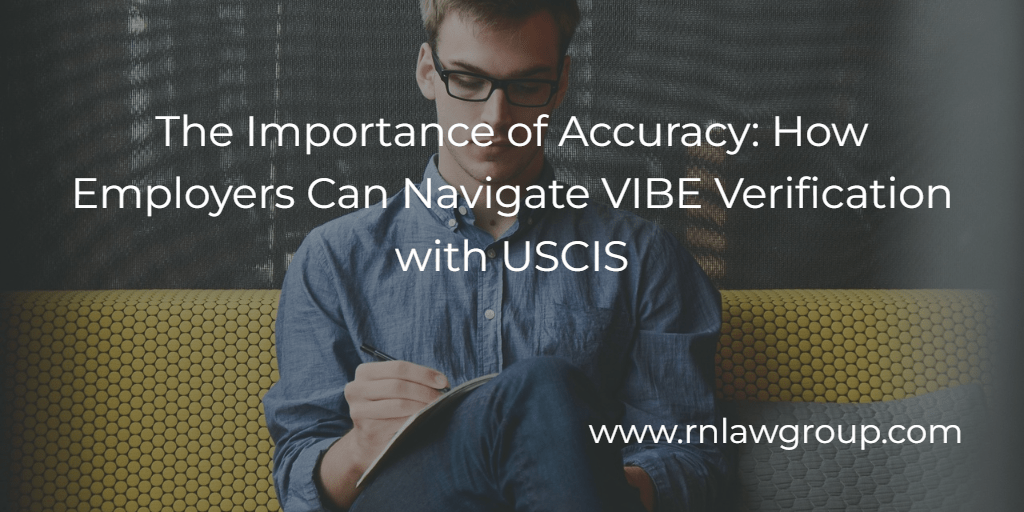
The Importance of Accuracy: How Employers Can Navigate VIBE Verification with USCIS
The United States Citizenship and Immigration Services (USCIS) uses a system called Validation Instrument for Business Enterprises, also commonly known as VIBE, to validate and verify the information provided by employers in support of various immigration applications.
When an individual applies for certain immigration benefits, such as an H-1B visa or employment-based green card, they often need an employer to sponsor them. As part of the application process, the employer is required to provide information about their business, such as the company’s name, address, organizational structure, size, and other relevant details.
USCIS uses the VIBE system to cross-check this information provided by the employer with various government and commercial databases to ensure its accuracy and legitimacy. The system helps verify important aspects of the employer’s business, such as its existence, location, and overall credibility.
How does USCIS use the VIBE System?
- Data collection: USCIS collects information about the employer from various sources, including commercial data providers, government records, and public sources. This data is compiled and stored in the VIBE database.
- Data validation: When an employer submits an immigration application, USCIS uses the information provided to validate it against the data stored in the VIBE database. This helps ensure that the information is consistent and accurate.
- Verification process: USCIS compares the employer’s information with external sources to verify its authenticity. This may involve checking business registrations, tax records, financial statements, and other relevant documents.
- Risk assessment: USCIS assesses the risk associated with the employer’s information by considering factors such as the company’s size, industry, duration of operation, and compliance with relevant laws and regulations.
- Decision-making: The information obtained through VIBE, along with other evidence and documentation, is used by USCIS officers to make informed decisions on immigration applications. If there are inconsistencies or concerns regarding the employer’s information, USCIS may request additional evidence or clarification.
Overall, the VIBE system helps USCIS maintain the integrity of the immigration process by verifying the legitimacy of employers and the information they provide. It ensures that immigration benefits are granted to genuine businesses and helps prevent fraud and misuse of the immigration system.
How does the VIBE System implicate employers?
USCIS may raise concerns regarding the Validation Instrument for Business Enterprises (VIBE) when the information provided by an employer during the immigration application process does not match the data in the VIBE database or if there are inconsistencies or discrepancies in the information. These issues will generally be presented in the form of a Request for Evidence (RFE) after the petition has been filed to USCIS.
Here are a few situations where USCIS might raise concerns:
- Inaccurate or inconsistent information: If the information provided by the employer, such as the company’s name, address, or other details, does not match the information in the VIBE database or if there are discrepancies between different sources, USCIS may raise concerns.
- Unverifiable or questionable employer details: If USCIS encounters difficulties in verifying the employer’s existence or legitimacy through the VIBE system or other available sources, it may raise concerns. This could be due to incomplete or insufficient information provided by the employer. A lot of the time this issue arises when the employer’s “office” address is a home or other residential/ non-commercial space.
- Non-existent or fraudulent employers: USCIS closely examines cases where there is suspicion of fake companies or fraudulent activities. If the employer’s information indicates that the business does not exist or if there is evidence of fraud, USCIS will raise concerns and thoroughly investigate the matter.
It’s important to note that USCIS uses the VIBE system as one of several tools to validate the information provided by employers. If concerns are raised, USCIS may request additional documentation or evidence to resolve any discrepancies or to further verify the employer’s details.
Tips for avoiding a VIBE Request for Evidence (RFE):
Although there is no perfect method to avoid any RFE, there are some ways that an employer can use due diligence to avoid VIBE issues with USCIS. Employers should ensure that the information they provide during the immigration application process is accurate, consistent, and verifiable. Examples of steps employers can take are listed below:
- Provide complete and accurate information: Employers should carefully review and double-check all the information they provide to USCIS. This includes the company’s legal name, address, contact details, and other relevant information. It’s crucial to ensure that all the information matches the official records and is consistent across all documents.
- Maintain up-to-date records: Employers should keep their business records up to date, including any changes in the company’s name, address, or other important details. It is essential to notify USCIS of any changes promptly to avoid discrepancies or confusion in the VIBE system.
- Location: Employers should ensure that the office space is a standalone office space that can show proof of lease or ownership. There is no square footage minimum required for the company office space. However, the employer’s physical location cannot be a P. O. Box and should not be a residential property.
- Prepare supporting documentation: Employers should gather and maintain supporting documentation that validates their business information. This may include business licenses, tax records, financial statements, lease agreements, employment contracts, and any other relevant documents that demonstrate the company’s legitimacy and operations.
- Respond promptly to USCIS requests: If USCIS requests additional information or documentation related to VIBE verification, employers should respond promptly and provide the requested materials in a timely manner. Delays or failure to comply with USCIS requests can raise concerns and potentially lead to complications in the immigration application process.
- Maintain consistent information across platforms: Employers should ensure that the information provided to USCIS aligns with the information available on other platforms, such as their official website, social media profiles, and business directories. Consistency in company information across different sources helps establish credibility and avoids discrepancies.
- Seek professional assistance: Employers can consult immigration attorneys or experienced professionals who are familiar with the application process and VIBE requirements. These professionals can provide guidance, review the information provided, and help ensure compliance with USCIS standards.
By following these practices, employers can minimize the risk of VIBE issues and increase the chances of a smooth immigration application process with USCIS.
Reddy & Neumann has been serving the business community for over 20 years and is Houston’s largest immigration law firm focused solely on U.S. Employment-based immigration. We work with both employers and their employees, helping them navigate the immigration process quickly and cost-effectively.
By : Jeanetly Garcia
Jeanetly Garcia advises employers and individuals through all phases of the non-immigrant visa process. As an attorney in the H-1B Department at Reddy Neumann Brown PC she is experienced in filing nonimmigrant petitions and applications for immigrant benefits, as well as, responding to USCIS issued requests for evidence concerning an array of legal issues.

